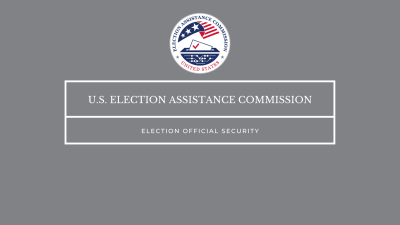
The threats to the safety and wellbeing of election officials are an unfortunate ongoing topic in the field over the past few years. Election officials, law enforcement and others have continued to work on mitigating strategies, support, and strategies to support the election community. There are solutions being made and implemented to address these threats, which involve the participation of both election officials and law enforcement.
EAC Commissioner Thomas Hicks led a panel discussion on election official security with Veronica Degraffenreid, former state election official in North Carolina and Pennsylvania and a Senior Manager of Strategic Partnerships for the Brennan Center of Justice, Tina Barton, former City Clerk from Michigan, and a Senior Election Expert for The Elections Group, and Justin Smith, former Sheriff of Larimer County, CO.
The participants talked about the importance and work of the Committee for Safe and Secure Elections (CSSE), of which the three panelists are members. CSSE consists of cross-partisan members from election administration and law enforcement, with the goal of supporting practices and policies that protect election officials and voters from threats, intimidation, and violence.
Receiving threats, or the increased possibility of an individual or office receiving a threat, affects the work being done in elections. Ms. Degraffenreid elaborated, “They have increasingly faced threats, intimidation, and violence as political leaders and other voices have cast doubt on the safety and security of America's elections. If election officials and workers feel unsafe carrying out their responsibilities or feel that they or their loved ones will become targets of harassment or violence, that means that they can't do their jobs.”
It cannot be overstated how these threats make it more difficult for election officials to do their jobs to the best of their ability. There have been a number of election officials who have decided to retire or leave their positions because of this issue. “People have reached breaking points as election officials, and they are leaving positions because the stress, the anxiety of it. The threats have become too much for some, and some just out of concern for their safety and the safety of their families have gone into a protection mode,” said Ms. Barton.
From the law enforcement side of the issue, there has been a shift toward greater understanding that elections are a critical part of the country’s infrastructure that also needs to be protected. This is supported by the federal designation of elections as critical infrastructure. Sheriff Smith said, “...we're coming to recognize that our local elections, process and facilities and people are a part of that critical infrastructure… It's not different than what we've dealt with other critical infrastructure. And we're applying that to the law enforcement level to see to it that we're working with our elections, partners within our communities, and making sure we have those plans to recognize the same process to protect them, their employees, the processes, the facilities, et cetera.”
Throughout the panel, speakers emphasized the need for cooperation and partnerships between election officials and law enforcement for successful efforts to mitigate these threats. There is support from both sides in understanding the issues and threats, and they have been working together to best prevent and address the problem as a whole and on an individual basis.
The panelists also spoke about what can be done to prepare for the next presidential election cycle in 2024. Their main point is to begin preparing now; start a dialogue between election officials and law enforcement so everything needed to prepare and respond to any issues is in place well ahead of the elections. Both sides of the equation, election officials and law enforcement, understand that there is an urgency surrounding this issue and are open to working together.
The panelists shared these tips for successful partnerships between election officials and law enforcement:
-
Follow the committee’s five-step plan of meet, share, agree, plan, and practice. View the full Five-Step Plan.
-
Share information and experiences to learn from each other.
-
Recognize the different perspectives, such as seeing a room from the function of an election center and the function of security purposes.
-
Decide who will respond to certain situations, such as deciding if someone is not following law would go to law enforcement or to courts.
-
Begin planning as soon as possible and do not wait until the last minute to start building relationships and pathways to collaboration.
-
CSSE also offers resources and videos for reference and training purposes.
The EAC also has resources to aid in keeping election workers mitigate and respond to threats. This includes resources on mental health, how to report threats, best practices, and a toolkit from CISA on nonconfrontational techniques for election worker training.

